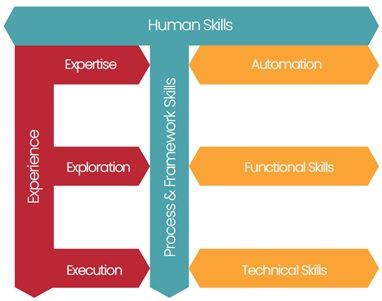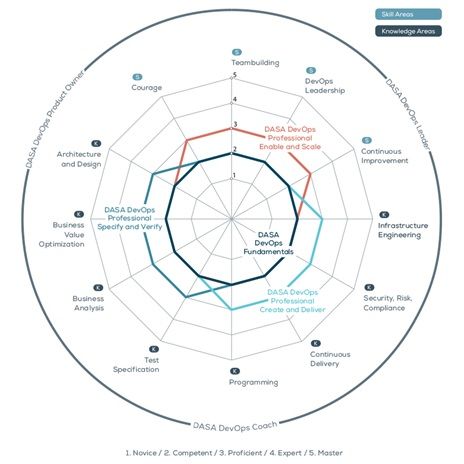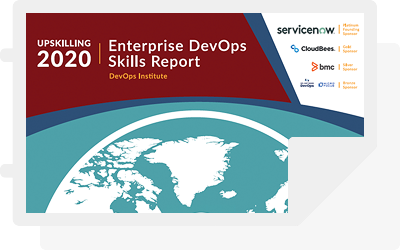The value of DevOps has continued to increase as digital transformation and cloud adoption initiatives have become mainstream in almost all sectors of the economy. OpsRamp reports that nearly three-quarters of survey respondents expect to either accelerate or maintain digital transformation initiatives and projects. Embracing DevOps practices is the only way to accelerate these activities through a seamless management of development and operation of digital solutions.
For any enterprise to maintain a competitive advantage in the digital age, having the right talent and competencies is essential. Let’s look at three frameworks that can provide guidance on the kind of skills needed for DevOps professionals.
DevOps: Practices and culture
DevOps practices are not just about automating deployments or having developers and systems admins sitting together. Instead, it is about a culture of collaboration, using capabilities to deliver applications and services at high velocity. As a result, the skills required go beyond just technical capability to include people skills. This combination of skills, practices, and culture drives the philosophes needed to achieve business objectives at the speed and quality that customers expect.
That’s why it might be difficult for companies or hiring managers to understand exactly what skills they need to hire, train, or seek in their talent. But three frameworks can help you navigate DevOps to find the right talent for your organization.
DevOps Institute
In their 2020 Upskilling Enterprise DevOps Skills Report, the DevOps Institute introduced the concept of the E-Shaped DevOps Human, shown in Figure 1 below.

Figure 1: The E-Shaped DevOps Human
This model defines human skills (breadth) and process & framework skills (depth), with four skill domains required by DevOps professionals represented by the 4 Es—experience and expertise, exploration and execution—mapped to three specific skill categories of automation, functional skills, and technical skills. Experience and expertise come with practice over time, while exploration and execution are more about passion and discipline.
| Top human skills in DevOps | Top process and framework knowledge |
|---|---|
|
|
| Top functional skills | Top technical skills |
|
|
With many jobs, the focus is on the technical, functional, and knowledge skills. In DevOps, human skills, or soft skills, are just as necessary. With these skills, your talent can address the culture aspects required to move from a silo-based mindset to one that supports DevOps ethos.
DASA DevOps Competence Model
Founded in 2016, DevOps Agile Skills Association (DASA) is an open, global community for DevOps and Agile skills development. The DASA DevOps Competence Model describes the essential skills needed in a DevOps team. The model (shown in Figure 2) has 12 capabilities, comprised of 4 skill areas and 8 knowledge areas, and outlines the expected behavior or knowledge for each.

Figure 2: DASA DevOps Competence Model
The four skill areas are:
- Courage. Evangelism, coaching, self-confidence, proactivity, reflection, trust, open discussions, experimentation, fail fast, courage to change.
- Teambuilding. Understand other points of view, collaboration, mutual accountability, common purpose, ability to integrally support the service/product.
- DevOps leadership. Facilitating teams to high performance, humility, transparency, Service lifecycle mindset, Stakeholder management.
- Continuous improvement. Today we do our work better than yesterday, Kaizen mindset, quality at the source, first time right, knowledge-sharing, ability to adapt.
The eight knowledge areas are:
- Business Value Optimization. Use of the IT service in real life, including direct feedback loop of user comments to team, service level management, definition of done, business activity/performance monitoring, business case management.
- Business Analysis. Functional requirements, non-functional requirements, longer term development of business process (based on translation of market developments), data analysis, and refinement.
- Architecture & Design. Ensuring fit between developments and current situation, overall service design, patterns & styles.
- Programming. Software engineering mastery, everything as code, data management.
- Continuous Delivery. Automated testing, deployment and release management, configuration management, version control, cloud, containerization, feature-driven delivery.
- Test Specification. Design of test cases, test concepts.
- Infrastructure Engineering. Technical monitoring, performance management (e.g. load balancing etc.), capacity and availability management, reliability engineering, cloud, containerization.
- Security, Risk & Compliance. Security, service continuity planning.
These 12 competence areas are ranked on five levels of capability, from novice through to master. The model suggests that not everyone in a DevOps team requires expert capability, but it is important that all the competence areas exist at expert capability within the team.
The model is useful in helping individuals and teams to determine how ready they are for DevOps, and if the team has the right set of skills and capabilities to achieve high-performance levels.
European e-Competence Framework (e-CF)
The e-CF provides a reference of competences as required and applied in ICT professional work environments, using a common language for competences, skills, and proficiency levels. These competences have been mapped to generic Role Profiles which offer users structure and clarity for designing or identifying and clustering the multitude of activities that are essential to support the digital strategy of an organization.
One of the 30 role profiles is a DevOps Expert role. In this role, the DevOps Expert implements processes and tools to successfully deploy DevOps techniques across the entire solution development lifecycle. The competences required for this role include (but are not limited to) the following:
- Application Development, Level 3
- Component Integration, Level 4
- Testing, Level 4
- Solution Deployment, Level 3
- Change Support, Level 3
DevOps as a journey
Just as digital transformation is a journey, a DevOps professional cannot acquire these skills from a single training exercise. The DevOps journey spans multiple domains over a long period of time through both individual and collaborative efforts.
Additional resources
For more DevOps strategies and topics, browse our BMC DevOps Blog or check out these related articles:
- The State of DevOps: A Report Roundup
- Is DevOps Dead?
- BMC DevOps Guide, with 30+ articles on practices, trends, culture, and hiring
- DevOps Salary Trends
- SRE vs DevOps: What’s The Difference?
- Scrum vs Kanban: A Comparison of Agile Methodologies







